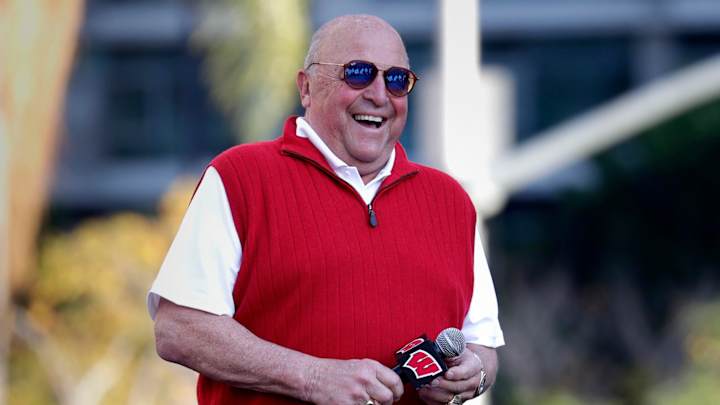Barry Alvarez Woke Up a Sleeping Giant at Wisconsin

The tributes are pouring in for Barry Alvarez, who is retiring after a remarkable run as coach and athletic director at Wisconsin. They are richly deserved.
Barry accomplished something that a lot of new coaches talk about, but very few coaches do. He changed the culture of a program, turned a school that was bumping along into a frequent champion and perennial contender.
He didn’t just do it in football. I very much believe that Barry’s ability to make football a winner helped pave the way for basketball to become a winner.
It wasn’t a magic formula, either.
He took what he had learned from playing linebacker for Nebraska legend Bob Devaney, and from coaching under Iowa legend Hayden Fry and Notre Dame legend Lou Holtz to become a Wisconsin legend.
That’s a lot of legends.
Alvarez, 74, who won three Big Ten championships as Wisconsin coach from 1990-2005, has been the school’s athletic director since 2004. On his watch, the Badgers have continued to field strong programs in football, men’s basketball and other sports, notably the women’s ice-hockey team, which won its sixth national championship this spring.
I first got to know Barry when he was a mere mortal. He was the defensive coordinator when Notre Dame won the 1988 national championship. I was the ND beat writer for the Chicago Sun-Times.
In those days, coaches didn’t regard sportswriters as the enemy. We had a good relationship. Right after covering Notre Dame’s visit to the Rose Garden to be honored by President Reagan, I hopped a flight back to Chicago.
The team stayed in Washington to sightsee. But Barry and one of his defensive assistants, John Palermo, were on the same flight. They were connecting in Chicago to go on a recruiting visit.
I had plans that night and wanted to write my story. But Barry motioned me over. There was room to move around on the flight—that’s how long ago it was—and we were chatting.
I remember him telling me he had offers to become a head coach. He said he wasn’t going anywhere. He wanted his daughter to finish high school in South Bend. And he wasn’t leaving Notre Dame until the right head-coaching job came along.
He stayed at Holtz’s side for another season. Then Pat Richter, the Wisconsin athletic director, called, urged on by chancellor Donna Shalala.
Somehow, Barry knew that Wisconsin, which had not had a winning season since 1984 and had not been to Pasadena since 1962, was the right job. The Badgers had gone 7-33 in Big Ten games in their previous five seasons, including 3-21 in their previous three seasons.
And yet, Alvarez didn't see a graveyard. He saw opportunity..
He knew that a sports-crazed state would embrace a winning college team the way it supported its beloved Green Bay Packers.
He knew that he could find the right players to develop a pounding offense and stellar defense. These are the components that win games in nasty Big Ten weather, against nasty Big Ten opponents.
It added up to this: On Alvarez’s watch, Wisconsin, which had not been to the Rose Bowl in 30 years, has gone to seven Rose Bowls. Three came with Alvarez as coach, and four more were achieved by coaches he groomed and picked to keep the program he built going.
At the end of the 1993 season, Wisconsin finished its season with an early December game against Michigan State—in Tokyo. The game came on late. I remember staying up to watch it, to make sure the Badgers nailed down their trip to Pasadena—which they did 41-20.
Seven Rose Bowls.
Since that first Pasadena trip after the 1993 season, only Ohio State, with three Rose Bowls and five playoff appearances, has made more pinnacle post-season trips among Big Ten teams.
And you know what? As a Badger alum, I wouldn’t trade with them. Pasadena is still the best (by far) post-season experience.
Buckeyes fans are disappointed when they don’t win the national championship. Badgers fans never get tired of playing in Pasadena.
That’s how I feel, anyway. And if other Badgers don’t feel that way, that’s a tribute to what Barry Alvarez built.
